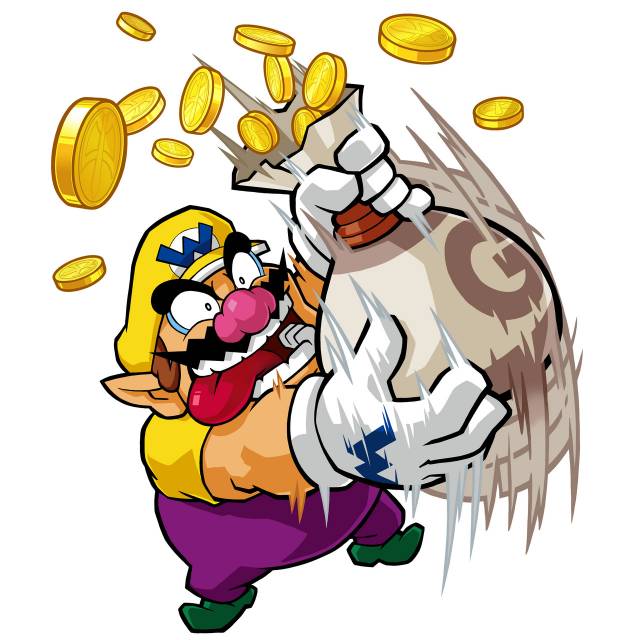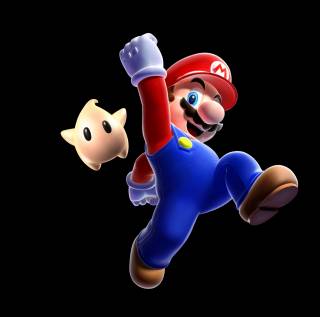It's a-me [copyrighted character]! - Part III (Blog Post)
By LawGamer 5 Comments
Hi all, sorry for the delay, but I've been busy. Hooding ceremony + graduation + 2 swearing in ceremonies (all on consecutive days) kind of takes it out of you.
Part I of this series provided some basic definitional background for discussing intellectual property issues. Part II then went into explaining just what the heck was going on between Nintendo and Let's Play. In this, the final part of the mini-series, we'll get a bit into the debate as to the moral and legal high ground in this whole issue, and then maybe get into a discussion about whether this is merely a poor implementation of a generally good copyright law, or whether the system needs a total overhaul.
Before we begin, there are a couple of points to get out of the way so that everyone can be on the same page during this discussion. The most important thing is to define just what we're saying when we use the word "right." I've noticed there is some equivocation in defining this term. Some people use it to refer to a legal entitlement to do something. Others use it as a moral concept. For the purposes of this discussion, if I use the word "right," I'm taking about the legal aspect. If I use the word "Right" with a capital "R," then I'm referring to the moral concept. Secondly, for the later part of the discussion, you may want to refer to my post on the Law of the Horse, located here. You don't have to, of course, but you'll hurt my feelings if you don't. With that out of the way, let's get to it.
So, Nintendo and Let's Play. Word is they've been going at it lately. I have made a short summary of some of the arguments each side is advancing below. Here's the tl;dr summary for those of you with short attention spans:


I. Let's Play's Arguments
Argument #1: C'mon man, we just love Nintendo games. We aren't really hurting Nintendo by doing this.
Why This Argument is Appealing: It appeals to our sense of Right. When watching the Let's Play videos, one does get the sense that the people doing them really DO love the games they are playing, making the whole thing more of a labor of love than an attempt to strike it rich.
Why It Has Problems: This doesn't help to explain away Nintendo's right to do what they are doing. Being in the Right isn't a whole lot of help if Nintendo can get a court to make them stop. Plus, if they loves the games so much, why aren't they OK doing this for free?
Argument #2: This is really stupid on Nintendo's part. Our video's provide them with all sorts of free advertising and exposure. If we can't profit from our work, we'll stop making videos and the free exposure for Nintendo will go away.
Why This Argument is Appealing: It has a certain intuitive appeal. Obviously, a YouTube video of someone having fun with one of their games has to be good for Nintendo. Right? Right?!
Why It Has Problems: The more you think about it, the less true this might seem. If you're watching a Let's Play video, then the chances are that you are already a pretty heavy gamer, in which case you have already made up your mind about Nintendo one way or the other. The target demographic for Nintendo's advertising are the people who are buying games for someone else who aren't necessarily gamers themselves, like parents, and they are unlikely to stumble onto Let's Play by themselves. If we are talking advertising in the sense of getting someone to buy something, then there is probably less of it going on here than we think.
Argument #3: We need the money.
Why This Argument is Appealing: Who doesn't like money? We've all been poor college students at one time or another right?
Why It Has Problems: So Let's Play's entire plan boils down to:
a. Post YouTube videos of you and your friends playing copyrighted games
b. ???????
c. Profit
and they're surprised when it doesn't work out? Really? Did they even think about maybe getting a real job? Losers.
Argument #4: We're protected by Fair Use
Why This Argument is Appealing: It gets more at Nintendo's right to do what they're doing than the other arguments. If you want Let's Play to win, you like this argument.
Why It Has Problems: As I explained in another post. Let's Play isn't covered by Fair Use. Maybe that's too strong. It's possible that they are covered by Fair Use (except they aren't). After all, anything is possible (even when it isn't).
II. Nintendo's Arguments
Argument #1: We hold the copyright, we can do what we want.
Why This Argument is Appealing: It's true. Nintendo does hold the copyright, and that does give them the right to dictate what can be done with it.
Why It Has Problems: It offends our sense of Right. Yes, they hold the copyright, but it isn't like they need to enforce it all the time. They could at least show a little restraint.
Argument #2: We aren't the bad guys here. We could have just issued takedown notices, but we didn't. We're just taking the ad money.
Why This Argument is Appealing: When phrased this way, it makes it seem like Nintendo is showing some restraint. Why shouldn't they at least get their cut?
Why It Has Problems: If all the revenue goes to Nintendo, Let's Play videos with Nintendo stuff will eventually stop getting put up, which effectively makes the move the same as issuing a takedown notice. Plus, it isn't like Nintendo needs the money. They made over $70 million last year. Wow, when you think about it, this is kind of more of a jerk move than just issuing the takedown notices, isn't it?
Argument #3: We have the right to control our brand. Yes, some of the Let's Play videos are really good, but others are produced by neckbeards in their mom's basement who swear a lot and think that's cool. We can't have our brand associated with that kind of stuff.
Why This Argument is Appealing: This is probably mostly appealing if you are in marketing or something. That said, Nintendo is pretty fiercely protective of its brand, particularly when it comes to Mario, so this kind of makes sense from their perspective.
Why It Has Problems: Again, it offends out sense of Right. Just what the hell is a brand anyway? All those millions you spend on TV advertising not enough for you Nintendo?
III. So Where Does This Leave Copyright?
How you feel about this is likely based on how you feel about Nintendo's actions here. If you think Nintendo is acting like a bunch of jerks, then you probably think that copyright law needs changes. If you see where Nintendo is coming from, then you are likely to say we should stay put.
What I find interesting about this isn't so much the nature of copyright law itself, but how the perception of it changes depending on how it is enforced. There does seem to be a bit of a disconnect present. Remember, copyright law is designed to further innovation by protecting original work. From this perspective, it should make no difference whether the person or entity advancing the innovation is big or small, yet it seems like it matters to those who have an opinion. In my Law of the Horse post, I mentioned how Jim Sterling was pleased that Warner Bros. was getting sued for violating copyright. From the comments I've been reading here, I'm guessing most people on these boards would agree. It's a case of the "little guy" sticking it to a major corporation. We feel that it is Right that Warner Bros. is getting sued, in the same way we feel Nintendo is Wrong for going after Let's Play.
But this is the crux of the disconnect. One of the central tenants of our legal system is that the law should treat everyone equally. In short, we feel like it is Right when it does so. If that is true, then it shouldn't matter whether it is the Nyan Cat guy or Nintendo trying to enforce a copyright. They both have a legal right to do so. If the law enforces those copyrights equally, then the law is Right. However, this conflicts with our general sense that the "little guy" is more deserving of protection than a faceless corporation, so agreeing with the above statements likely causes you some discomfort. Agreeing with one statement means giving up the other, at least to some extent. It is of course possible to argue that the law isn't being enforced equally - that large corporations have an easier time paying for access to the system and competent legal help than someone working out of their apartment. That might be true. However it also isn't, strictly speaking, a legal problem, but an economic one instead (obviously the economics of it affect the law, but that's an issue of access, not copyright specifically). One wonders if that inequity were solved whether or not there would still be the level of discomfort with copyright principles that we have right now.
If you want my opinion, changes are probably needed, although not specific to video games. When I was in law school, I took a class called "Internet Law," which discussed the Law of the Horse and whether we needed laws specifically related to the internet. At the time, I my opinion was we didn't need anything new. The more I've thought about it though, the more I think certain laws need to be overhauled. I'd probably address the problem from the perspective of "Digital Law" rather than the internet or video games specifically. Specifically in the realm of copyright, the digital age has created a whole host of new problems. What caused me to change my mind? For one, it is a lot easier to duplicate material than it was previously. Before home computers and things got really popular, it actually took quite a bit of effort to reproduce and sell a work. For example, if you wanted to sell a book, you needed a physical device like a printing press to actually make it, and then a physical location from which to sell your product. In other words, if you were producing what today we would refer to as "content," you were either a pirate who didn't care if you were violating copyright or not, or you had invested so much in the project that you would make damn sure your work was unique enough that you wouldn't be sued.
In today's world, producing and selling content is much, much easier. Certainly there is effort involved on the part of Let's Play here, but it isn't nearly as much as it would have been 20, 10 or even 5 years ago. Pretty much all someone needs is a webcam and an internet connection and they can produce and post a video on YouTube and get advertising money for it. Not only does this make it easier for pirates to sell copyrighted material illegally, but it makes it easier for an average person to violate copyright without knowing it. In the past, you would probably have consulted a lawyer, or at least done some research before selling something where copyright may have been an issue. Today, someone is much more likely to say, "that's cool, let's post it," without even thinking about the legal consequences of copyright.
Given this new reality, it seems like a good idea to create some new form of copyright rules, if for no other reason than to make it clear to people when they are stepping over the line. The major question for me when doing this is whether we want the new rules to be legislative or common-law (judge made). Obviously, the legislative approach will have the advantage of being (comparatively) quick, but runs the same risk we have now; some other new technological change comes along that makes the new rules obsolete again. A common-law approach would be more likely to be fair in any given individual case. That said, judges disagree all the time, and this approach runs the risk of the circuit courts splitting on the issue, leading to more confusion than we have now. In other words, with a common law approach, the problem is likely to get worse before it gets better.
---
On a semi-related note, I've kind of been surprised by the reaction to these posts. I had originally started these just so I could have something to do while looking for a job. I wasn't expecting to get such a huge response from the community. With that in mind, I thought that I would let you guys determine the direction of my next topic. There are several things I could write about, many of which I had intended to do a while ago, but then, you know, school. Possibilities include:
1. Another primer sort of like this one but on the rash of bankruptcies that happened a while back.
Pros: I'm more knowledgeable about bankruptcy than I am about copyright, which is to say I had a class on it. And an internship.
Cons: Unfortunately my knowledge is mostly about individual Chapter 7s and 13s, not Chapter 11s, which is what got filed. It's also not exactly topical, since the whole THQ thing happened a few months back
2. Writing about the new XboxOne or whatever the hell their calling it. I'd probably focus this on DRM, how Microsoft is handling the used game market and why these things tend to make us uncomfortable.
Pros: It's a hot button topic these days. It would also allow me to get my inner law nerd on by discussing Underkuffler a bit.
Cons: We don't know a whole lot right now about the specifics of Microsoft's system. This might be better held until after E3, when Microsoft will presumably discuss this a bit more.
3. The 38 Studios fiasco.
Pros: This could be interesting if I figure out how to do it right. It has everything you could possibly want; fraud, bad government, murder (alright - I made that up), and some guy who is apparently famous for wearing a bloody sock or something.
Cons: This would take me a while to write. The whole saga is pretty complicated, so I'd need to do some research on Rhode Island law and the actual legal issues getting thrown around.
4. Some other topic you find interesting.
Vote in the comments. I'd make a poll, but I can't seem to do that within a post.
--
EDIT: I'm aware that there is some weirdness going on with the pictures up top. The text isn't supposed to be between them like that. I can't seem to fix it. Just imagine the text being on its own line.

5 Comments